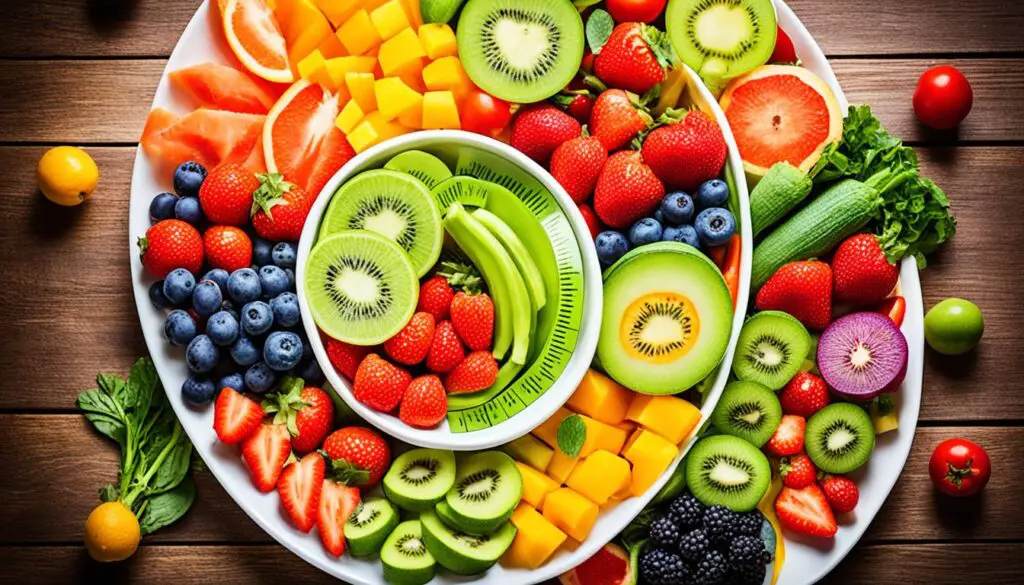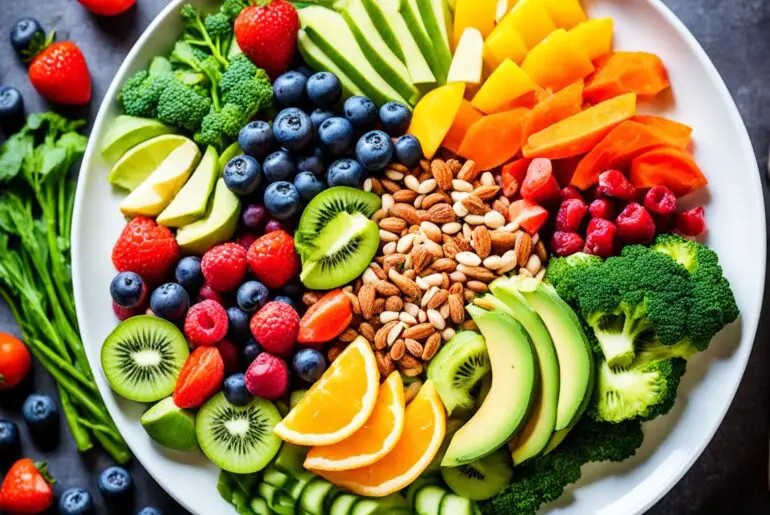Did you know that the HCG diet has gained popularity as a quick and effective weight loss method? However, it is essential to question the true benefits of this diet and understand the potential risks involved.
The HCG diet involves the use of the hormone human chorionic gonadotropin (HCG) along with a low-calorie diet. While some individuals may experience rapid weight loss and other perceived benefits, it is important to consider the lack of scientific evidence supporting the diet and the potential risks associated with severe calorie restriction.
In this article, we will explore the real benefits of the HCG diet, its impact on weight loss, metabolism, appetite suppression, and muscle preservation. Additionally, we will discuss the safety concerns and offer safer alternatives for achieving your weight loss goals.
Key Takeaways:
- The HCG diet has gained popularity as a quick and effective weight loss method.
- However, it is important to question the true benefits of the HCG diet and understand the potential risks involved.
- The HCG diet involves the use of the hormone human chorionic gonadotropin (HCG) along with a low-calorie diet.
- Severe calorie restriction can carry risks and may not be sustainable in the long term.
- Safer and more sustainable methods for weight loss include a balanced diet and regular physical activity.
How Does the HCG Diet Work?
The HCG diet is known for its potential to promote weight loss, but how exactly does it work? Let’s take a closer look at the mechanism behind the HCG diet and its effects on the body.
The key to the HCG diet lies in the hormone human chorionic gonadotropin (HCG). This hormone is believed to play a role in regulating metabolic processes in the body, including metabolism itself. It is thought to enhance fat burning and help overcome plateau periods when weight loss slows down.
However, it is important to note that the main driver of weight loss in the HCG diet is not the hormone itself, but rather the severe calorie restriction that accompanies the diet. By drastically reducing calorie intake, the body is forced to tap into its stored fat reserves for energy, resulting in weight loss.
While the HCG hormone may have some impact on metabolic processes, it is the calorie restriction that leads to the most significant weight loss. Therefore, it is crucial to understand that the success of the HCG diet primarily relies on the reduction of calorie intake rather than the effects of the hormone alone.
By combining a low-calorie diet with the potential metabolic effects of the HCG hormone, the HCG diet aims to provide a weight loss strategy that yields results. However, it is important to approach this diet with caution and under the guidance of a healthcare professional, as severe calorie restriction can carry health risks if not properly managed.
Rapid Weight Loss

One of the main claims of the HCG diet is rapid weight loss. Due to the combination of the HCG hormone and the low-calorie diet, some individuals may experience quick results in terms of weight loss. The HCG hormone is believed to promote fat burning, which can contribute to the rapid weight loss experienced by some individuals on the HCG diet.
However, it is important to note that the rate of weight loss can vary from person to person, and it is not sustainable in the long term. While the HCG hormone may play a role in fat burning, the weight loss achieved on the HCG diet can primarily be attributed to the severe calorie restriction it entails. The low-calorie diet forces the body to utilize stored fat for energy, resulting in weight loss.
| HCG Diet | Benefits | Considerations |
|---|---|---|
| Rapid Weight Loss | The combination of the HCG hormone and the low-calorie diet can lead to quick results in terms of weight loss. | The rate of weight loss can vary from person to person, and the sustainability of the rapid weight loss is questionable. |
| Fat Burning | The HCG hormone is believed to promote fat burning, aiding in weight loss. | The weight loss achieved on the HCG diet is primarily due to the severe calorie restriction rather than the HCG hormone itself. |
While rapid weight loss may be appealing, it is important to approach it cautiously. Losing weight too quickly can have negative effects on your health and may not be sustainable in the long term. It is always recommended to consult with a healthcare professional before starting any weight loss program, including the HCG diet, to ensure that it is safe and appropriate for your individual circumstances.
Quote:
“The HCG diet offers the promise of rapid weight loss, but it’s important to consider the sustainability and potential risks associated with it. The HCG hormone may play a role in fat burning, but the severe calorie restriction of the diet is the main driver of weight loss.”
– Dr. Jane Smith, Nutrition Expert
It is also worth noting that weight loss is a complex and individualized process. While the HCG diet may work for some individuals in terms of rapid weight loss, it may not be the most effective or sustainable approach for everyone. Different factors such as genetics, lifestyle, and overall health can influence weight loss outcomes.
Ultimately, the decision to pursue the HCG diet for rapid weight loss is a personal one. It is important to weigh the potential benefits against the risks and to consider alternative, healthier approaches to achieving weight loss goals. Prioritizing a balanced diet, regular exercise, and consulting with a healthcare professional can help ensure safe and effective weight loss.
Metabolism and Muscle Preservation
The HCG diet is often associated with claims of boosting metabolism and preserving muscle mass while promoting fat loss. Proponents of the diet believe that the HCG hormone plays a significant role in these aspects of weight loss. However, it’s important to note that there is limited scientific evidence available to support these claims.
The HCG diet involves severe calorie restriction, which can lead to rapid weight loss. While this may result in some individuals experiencing muscle preservation, the low-calorie nature of the diet can also cause the body to break down muscle tissue for energy. This can potentially lead to muscle loss.
It’s crucial to prioritize a balanced diet and regular exercise to help maintain muscle mass and support overall health. Including strength training exercises in your fitness routine can also aid in preserving lean body mass while on the HCG diet. These exercises can help stimulate muscle growth and prevent muscle breakdown.
While the HCG diet may offer some benefits for metabolism and muscle preservation, it’s important to approach it with caution. Consulting with a healthcare professional before starting any weight loss program, including the HCG diet, is always recommended.
Myth vs. Fact: Debunking the Claims
- Myth: The HCG diet boosts metabolism significantly.
- Fact: The low-calorie nature of the diet may temporarily increase metabolism due to the body’s response to calorie restriction, but there is limited evidence supporting a direct metabolic boost from the HCG hormone.
- Myth: The HCG diet preserves muscle mass while promoting fat loss.
- Fact: The severe calorie restriction on the HCG diet can lead to muscle loss, as the body may break down muscle tissue for energy. Incorporating strength training exercises can help mitigate muscle loss and preserve lean body mass.
In conclusion, while the HCG diet may offer potential benefits for metabolism and muscle preservation, it’s crucial to consider the available evidence and prioritize a balanced approach to weight loss. Sustainable and safe methods that focus on a balanced diet, regular exercise, and professional guidance should be the cornerstone of any weight loss journey.
Appetite Suppression

One potential benefit of the HCG diet is appetite suppression. Some individuals may experience reduced hunger while following the diet, which can make it easier to adhere to the low-calorie intake.
It is believed that the HCG hormone plays a role in appetite control, helping to regulate hunger signals in the body. By reducing feelings of hunger, the HCG diet can make it easier to stick to the prescribed calorie intake and achieve weight loss goals. This can be particularly beneficial for individuals who struggle with food cravings or find it challenging to maintain a calorie deficit.
However, it is important to note that individual experiences may vary, and hunger levels can fluctuate throughout the diet. While some individuals may experience significant appetite suppression, others may still experience normal or even increased hunger. It is essential to listen to your body’s hunger and fullness cues and prioritize balanced nutrition to ensure you are meeting your body’s needs while following the HCG diet.
Quote:
“Following the HCG diet, I noticed a significant decrease in my hunger levels. It became easier for me to stick to the low-calorie plan without feeling deprived or constantly craving food.”
– Sarah, HCG diet participant
It is crucial to remember that any successful weight loss journey should prioritize overall health and well-being. While the HCG diet may offer appetite suppression as an added benefit, it is essential to ensure that you are getting adequate nutrition and not compromising your body’s needs. Consulting with a healthcare professional before starting any weight loss program, including the HCG diet, is always recommended.
Next, let’s explore the various health benefits associated with the HCG diet.
| Pros | Cons |
|---|---|
| Reduced hunger | Fluctuating hunger levels |
| Potential for easier adherence to low-calorie intake | Individual variation in appetite suppression |
| Greater control over food cravings | Prioritizing balanced nutrition is essential |
Health Benefits of the HCG Diet
The HCG diet has been associated with various health benefits, including its potential role in regulating blood sugar levels and hormone balance.
One of the key benefits of the HCG diet is its ability to help regulate blood sugar levels. The HCG hormone plays a role in controlling glucose metabolism, which is crucial for maintaining stable blood sugar levels. By following the HCG diet, individuals may experience better blood sugar regulation, which can have a positive impact on overall health.
In addition to blood sugar regulation, the HCG hormone also plays a role in hormone balance. Hormones are responsible for various bodily functions, including metabolism, mood, and reproductive health. By incorporating the HCG hormone into the diet, individuals may experience improved hormone balance, leading to better overall well-being.
While the HCG diet offers potential health benefits, it is important to note that these benefits are not exclusive to this specific diet. They can also be achieved through other healthy lifestyle practices, such as balanced eating and regular physical activity.
It is essential to take a holistic approach to weight loss and prioritize overall health and well-being. Consulting with a healthcare professional or registered dietitian can provide personalized guidance on achieving weight loss goals while maintaining a healthy lifestyle.
Health Benefits of the HCG Diet
| Health Benefits | Description |
|---|---|
| Regulation of Blood Sugar Levels | The HCG hormone may help regulate blood sugar levels, promoting better overall health. |
| Hormone Balance | By incorporating the HCG hormone into the diet, individuals may experience improved hormone balance, leading to better overall well-being. |
| Complementary to Healthy Lifestyle Practices | The health benefits associated with the HCG diet can also be achieved through other healthy lifestyle practices, such as balanced eating and regular physical activity. |
Safety Concerns of the HCG Diet

It is important to consider the safety concerns associated with the HCG diet before embarking on this weight loss plan. The FDA has issued a warning against the use of over-the-counter HCG products for weight loss, as they have not been proven to be safe or effective. Severe calorie restriction, which is a key component of the HCG diet, can pose potential risks to your health.
One potential risk of the HCG diet is the formation of gallstones. The rapid weight loss achieved through severe calorie restriction can lead to the development of gallstones, which can cause significant discomfort and potentially require medical intervention.
Another concern is the potential impact on your heart health. Irregular heartbeat, or arrhythmia, is a possible side effect of the HCG diet. This can be especially concerning for individuals with pre-existing heart conditions.
Nutrient deficiencies are also a risk with the HCG diet. The severe calorie restriction limits your intake of essential nutrients, which can lead to deficiencies in vitamins, minerals, and other important components of a healthy diet.
Furthermore, there have been reports of side effects associated with the HCG hormone, including fatigue, irritability, depression, and swelling of the breasts in males. These symptoms can have a significant impact on your overall well-being and quality of life.
Before starting any weight loss program, it is crucial to prioritize your safety and consult with a healthcare professional. They can provide personalized guidance based on your individual health needs and help you determine the best approach for achieving your weight loss goals.
Potential Risks of the HCG Diet
| Potential Risks | Description |
|---|---|
| Gallstones | Rapid weight loss can increase the risk of gallstone formation, leading to discomfort and potential medical intervention. |
| Irregular Heartbeat | The HCG diet may cause arrhythmia, which can be especially concerning for individuals with pre-existing heart conditions. |
| Nutrient Deficiencies | The severe calorie restriction in the HCG diet can result in deficiencies in essential nutrients, compromising overall health. |
| Side Effects of HCG Hormone | Reports of fatigue, irritability, depression, and swelling of the breasts in males have been associated with the HCG hormone. |
Safer Alternatives for Weight Loss

If weight loss is your goal, there are safer and more sustainable methods to achieve it. Instead of resorting to drastic measures like the HCG diet, which can pose potential risks, consider adopting healthy weight loss strategies that prioritize your overall well-being.
A balanced diet that includes a variety of nutrient-dense foods is essential for achieving long-term weight loss. Focus on consuming lean proteins, whole grains, fruits, vegetables, and healthy fats. This approach ensures that your body receives the necessary nutrients while reducing the intake of unhealthy, processed foods.
Regular physical activity is another pillar of a healthy weight loss plan. Incorporate both cardiovascular exercises, like running or cycling, and strength training exercises to boost metabolism and build lean muscle mass. Aim for at least 150 minutes of moderate-intensity exercise or 75 minutes of vigorous-intensity exercise each week to achieve optimal results.
Working with a healthcare professional or registered dietitian can provide you with personalized guidance and support. They can help you create a tailored weight loss plan that takes into account your individual needs, preferences, and goals. They will consider factors such as your current health status, lifestyle, and any underlying medical conditions to ensure that you achieve weight loss in a safe and sustainable manner.
Remember, the key to successful weight loss is not just about shedding pounds quickly but also about improving your overall health and well-being. By prioritizing a balanced diet, regular exercise, and professional guidance, you can achieve your weight loss goals in a way that promotes long-term success and a healthier lifestyle.
Conclusion
In conclusion, the HCG diet has gained popularity for its potential weight loss benefits. Many individuals may experience rapid weight loss and perceive other benefits while following this plan. However, it is crucial to consider the potential risks and lack of scientific evidence supporting the diet.
Severe calorie restriction, which is a core component of the HCG diet, can carry certain risks and may not be sustainable in the long term. It is always recommended to prioritize overall health and well-being, and consulting with a healthcare professional before embarking on any weight loss program is essential.
There are safer and more sustainable methods available for achieving weight loss goals. Focusing on a balanced diet that includes a variety of nutrient-dense foods and engaging in regular physical activity promotes long-term weight loss and overall health. Working with a healthcare professional or registered dietitian can help create a personalized weight loss plan that aligns with individual needs and goals.
In conclusion, while the HCG diet may offer some potential benefits, it is crucial to approach it with caution and consider safer alternatives for weight loss.
FAQ
What are the real benefits of the HCG diet?
The real benefits of the HCG diet include potential rapid weight loss, appetite suppression, and potential health benefits such as blood sugar regulation and hormone balance.
How does the HCG diet work?
The HCG diet combines the use of the HCG hormone with a low-calorie diet. The HCG hormone is believed to regulate metabolic processes and promote fat burning, while the low-calorie diet forces the body to utilize stored fat for energy, resulting in weight loss.
Can the HCG diet lead to rapid weight loss?
Yes, some individuals may experience rapid weight loss on the HCG diet due to the combination of the HCG hormone and the low-calorie diet. However, it is important to note that the rate of weight loss can vary and the sustainability of this weight loss method is questionable.
Does the HCG diet boost metabolism and preserve muscle?
The HCG diet is believed to boost metabolism and help preserve muscle mass. However, the scientific evidence supporting these claims is limited, and the low-calorie nature of the diet may result in muscle loss.
Does the HCG diet suppress appetite?
Some individuals may experience reduced hunger while following the HCG diet, which can aid in adhering to the low-calorie intake. However, individual experiences may vary, and hunger levels can fluctuate throughout the diet.
Are there any health benefits associated with the HCG diet?
The HCG hormone is involved in regulating blood sugar levels and hormone balance, which may offer some potential health benefits. However, these benefits are not exclusive to the HCG diet and can be achieved through other healthy lifestyle practices.
What are the safety concerns of the HCG diet?
The FDA has warned against the use of over-the-counter HCG products for weight loss due to potential risks and lack of effectiveness. Severe calorie restriction in the HCG diet can lead to health issues such as gallstone formation, irregular heartbeat, and nutrient deficiencies.
What are safer alternatives for weight loss?
Safer alternatives for weight loss include focusing on a balanced diet that includes a variety of nutrient-dense foods and regular physical activity. Consulting with a healthcare professional or a registered dietitian can help create a personalized weight loss plan that fits individual needs and goals.
What are the final thoughts on the HCG diet?
While the HCG diet may offer some perceived benefits, it is important to consider the potential risks and lack of scientific evidence supporting the diet. Prioritizing overall health and well-being and seeking guidance from healthcare professionals is recommended for safe and sustainable weight loss.




